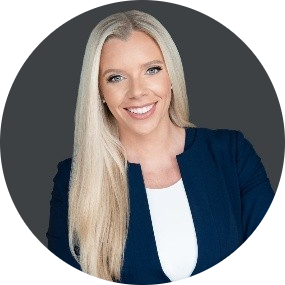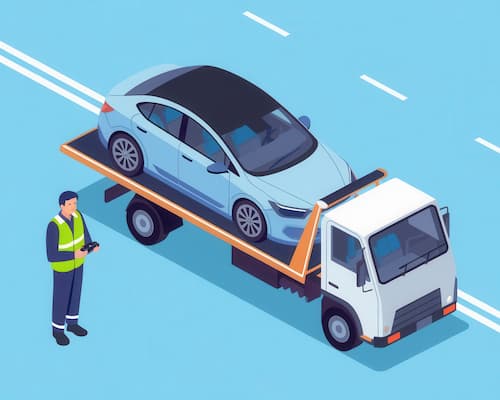The keys to choosing the right commercial auto insurance policy
There are steps you can take to ensure you get the policy that best fits your business, including assessing your needs, comparing insurers, and considering policy limits and deductibles.
1. Assessing your business
Every business is unique, as are the risks you and your drivers face while using your vehicles for company purposes. High-risk industries typically need higher liability limits and may need optional coverages to protect the company fully.
For instance, real estate agents are at lower risk because they primarily use vehicles for client meetings and to complete transitions. By contrast, taxi or rideshare drivers have a higher liability exposure because they transport passengers. Construction and delivery are also high-risk industries due to frequent trips and carrying heavy loads that can cause catastrophic damage in an accident.
Specific assessments you’ll need to make include:
Counting the number and type of vehicles you have
The size, value and function of your vehicles will directly affect your premium and coverage options. A work truck outfitted with heavy-duty gear has different risks and insurance costs than a sedan used by a real estate agent for showings and other appointments. Likewise, a fleet of vehicles would cost more to insure than a single company vehicle.
Assessing how your vehicles are used
Are your vehicles used for deliveries, transporting equipment or driving to job sites? The more time you or your employees spend on the road or in highly trafficked locations, the more likely you are to get into an accident and the more coverage you may need.
Collecting the names of drivers and their driving history
Who’s behind the wheel of your business’s vehicles matters. The driving history of each employee will factor into your company’s risk profile and final premium.
Choosing experienced, safe drivers with clean records will usually result in lower premiums than drivers with little experience or a history of tickets or accidents.
Knowing your state’s requirements
Each state has minimum coverage requirements for personal and commercial vehicles. Make sure you’re compliant, but also consider whether the minimum is enough coverage for your business risk.
Understanding your coverage options
Your policy coverage should reflect the real-world risks your business faces. Almost all states require liability coverage, which covers bodily injury or property damage that someone driving your company vehicles causes to others. You may also need:
- Collision coverage: Pays for damage to your business vehicle from a collision with another car or object, or a single-vehicle rollover, no matter who’s at fault.
- Comprehensive coverage: Applies to non-collision events like damage from a natural disaster, fire, theft or vandalism.
- Medical payments coverage: Reimburses medical expenses for your driver and passengers injured in an accident.
If you lease or finance company vehicles, the leasing company or lender will require comprehensive and collision coverage.
There are also policy add-ons for more protection. Depending on the nature of your business, you may want to include:
- Gap insurance. Covers the difference between your vehicle’s actual cash value (ACV) and your loan balance if it gets totaled and you owe more than it’s worth.
- Hired and non-owned auto insurance (HNOA). Provides liability coverage to your employee’s personal vehicles if they use it to complete work tasks.
- Motor truck cargo insurance. Provides coverage for lost or damaged goods in transit.
- Rental reimbursement. Covers the cost of a temporary replacement while your commercial vehicle is being fixed from a covered loss.
- Roadside assistance. Provides coverage if one of your business vehicles breaks down on the road.
- Uninsured/underinsured motorist coverage. Covers your company vehicles if they get hit by someone who doesn’t have insurance or enough liability coverage to pay for the damage.
2. Comparing insurance companies and policies
Once you’ve properly assessed your needs, you can start shopping for a policy.
Price is important, but it’s not the only thing to focus on when getting commercial auto quotes. Insurance policy coverages, exclusions and limitations vary by company, so it’s a good idea to get at least three quotes from different providers to compare.
Insurance.com recently compiled a list of the top 10 commercial auto insurance companies.
Kelly Lau, product general manager of Roamly, a digital insurance company specializing in RV and commercial fleet insurance, recommends checking third-party reviews from companies like Trustpilot to gauge an insurer’s reputation and customer satisfaction.
Working with an experienced insurance agent or brokerage can ensure you’re partnered with a company that specializes in your industry and understands the risks your business may face.
“Equally important is choosing a company with experience and expertise in your specific industry — whether you’re a contractor, a repair shop, or managing a car-sharing fleet — since your insurance should function as a tailored risk management tool,” Lau says.
You also should ask about the commercial claims process to understand how it works and what’s expected of you and your drivers if something happens.
3. Considering policy limits and deductibles
Getting the cheapest policy sounds great for your finances, but it could be a costly mistake if a driver gets into an accident. Make sure your policy limits and deductibles are realistic and match your budget and risk tolerance.
Most insurance experts recommend at least $1 million combined single limit (CSL) liability policies for commercial vehicles. A $1 million CSL may sound excessive, but if one of your drivers causes a serious accident, medical and legal expenses can easily exceed state minimum limits.
If your company has more assets, you may need even higher limits to reduce your risk exposure. You might also need to meet requirements for Department of Transportation compliance and Federal Motor Carrier Safety Administration (FMCSA) regulations if you drive across state lines, have heavy trucks or transport people.
Higher deductibles can lower your premium to align with your budget, but require more out of pocket when you file a claim. Consider how much you can afford to pay and the savings you’ll receive by taking on more financial responsibility when setting your deductibles.
When do you need commercial auto insurance?
You need commercial auto insurance if:
- You use vehicles to transport tools, equipment or people
- Your company owns, leases or rents vehicles for business use
- Employees drive company or personal vehicles for work
Even if it’s a part-time gig, like a handyman business or ridesharing, commercial auto coverage can help protect you from financial losses that personal insurance may not cover.
Questions to ask when choosing a commercial auto policy
Asking the right questions before signing on the dotted line can help you identify any potential gaps in the policy that could leave you at risk. Here are some questions to ask your insurance agent before buying commercial auto insurance:
- Does this policy cover all drivers and vehicle users?
- What happens if one of our employees uses their personal vehicle for work purposes?
- Is my type of business or vehicle use excluded from this policy?
- What happens if I add or remove vehicles or drivers mid-term?
- How are claims handled and how quickly are they processed and paid?
- Is there 24/7 customer and claims support?
- How easy is it to file and track claims?
The more you understand up front, the easier it is to find the right policy for your business and the fewer surprises down the road.
Mistakes to avoid when choosing a policy
To make sure you get the right policy, you should avoid:
- Choosing the lowest premium without comparing coverage and customer satisfaction
- Buying state minimum liability to save money
- Failing to list all drivers on your policy or reviewing their driving record before allowing them to drive for you
- Assuming a personal auto policy will cover your business vehicles
- Forgetting to update your insurer when your business operations, drivers or vehicles change
- Skipping optional coverage to save money
“One of the biggest and most common mistakes that small business owners make is that they only rely on their personal auto coverage for business driving,” Demanda says. “When you need to make a claim in that situation, you’ll most likely be denied.”
Other mistakes include not regularly reviewing your policy to ensure it still provides adequate protection for you, your employees, and your fleet, and not making adjustments as necessary to stay properly covered, Lau says.
“By taking these steps, you can avoid costly gaps in coverage and ensure your business is protected as it develops and grows,” Lau says.

What our expert says
FAQs
What’s the difference between commercial and personal auto insurance?
Commercial insurance covers vehicles a business owns, rents or leases. It can also provide coverage for employees who use their personal vehicles for business purposes. A personal auto policy covers individuals and families using vehicles for personal use and typically excludes business usage.
Can I use my personal vehicle for business with a commercial policy?
Yes. Although a personal insurance policy typically won’t cover business use in your vehicle, a commercial policy can cover you for both personal and business use.
What’s included in a basic commercial auto policy?
A basic commercial auto policy includes liability coverage that meets or exceeds your state’s minimum requirements. A full coverage policy also includes medical coverage for the occupants of your commercial vehicles and comprehensive and collision coverage that pays for damage to your business vehicles in a covered loss.







